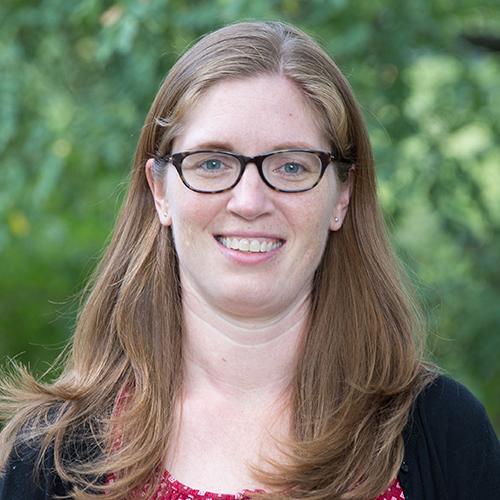Sara Witmer2018 Rising Alumni

Sara Witmer is an Associate Professor of School Psychology and Co-Director of School Psychology Programs at Michigan State University. She has a master’s and PHD in educational psychology, and is known for her work on how to use assessment and accommodation to enhance instructional decision making for students with disabilities and English language learners. Sara also stands out for her commitment to projects that provide not only professional development and mentoring, but remove financial barriers for graduate students.
Employer
Associate Professor of School Psychology and Co-Director of School Psychology Programs, Michigan State University
CEHD Degree
MA Educational Psychology, 2002; PhD Educational Psychology (School Psychology), 2004
Please list any professional accomplishments you wish to mention.
I was invited by my former advisor (James Ysseldyke) and his former mentor (John Salvia) to co-author an educational assessment textbook that is now it is 13th edition (Assessment in Special and Inclusive Education); I have been a member of the author team for the four most recent editions. With the support of my current faculty colleagues at Michigan State University, I developed a federally-funded training grant program (Project SPARKLE) that provided specialized training to school psychologists in the area of K-12 literacy development. I served as an associate editor for the Journal of School Psychology.
Please list any past or current volunteer activities.
I volunteer at Heartside Ministries, which is an organization committed to serving the homeless in the downtown Grand Rapids, Michigan area.
What professor(s) or course(s) were most influential during your time in CEHD?
Although I was influenced by many professors and courses, I think it was actually the opportunity to serve as a research assistant at the National Center on Educational Outcomes (NCEO) that was the most influential experience I had during my time at the University of Minnesota. Through NCEO, I had the opportunity to learn from and work with a variety of individuals who had a strong passion for improving the educational outcomes of students with disabilities and English language learners through the development of more inclusive large-scale assessment and accountability programs. This was something I had extremely little background knowledge about, nor interest in, prior to graduate school. But as I had the opportunity to more closely explore related issues with NCEO staff, I learned more and more about the desperate need for critical thinking and quality information to help guide better decision-making in this area.
What was the impact and benefit of your educational experience in CEHD?
Through my experience in CEHD, I had the opportunity to take classes designed and instructed by school psychology professors who are now considered legends in the field (e.g., James Ysseldyke, Sandra Christenson). They offered training in models for school psychology service delivery that were highly progressive, and critical for ensuring that school psychologists could have the most positive impact possible through their work in schools and communities. Their commitment to engaging in both research and school psychology training efforts that have the greatest potential for helping to improve services and outcomes for children and adolescents is something that I hope I am able to instill within my own school psychology students.
What's a good book you'd recommend to others?
The Undoing Project: A Friendship that Changed Our Minds by Michael Lewis.
What is your favorite memory from the University of Minnesota?
This might sound odd, but I loved taking Metro Transit to and from campus. Compared to other places where I have lived, Minneapolis has so many different types of people who are regular bus riders, and I loved experiencing that diversity. Taking the bus also provided a regular opportunity to relax and see so many fun downtown landmarks on a daily basis.
Who has inspired you the most during your career?
My dad (Martin Bolt) really ignited my original interest in psychology and the application of psychological principles to other disciplines, such as education. He was an undergraduate psychology professor and wrote an instructor's manual for a leading textbook in introductory psychology. As a kid, it was common that our family would accompany him on trips to visit new museum exhibits illustrating various psychological phenomena or to various professional conferences, which I really grew to really enjoy. Both my graduate advisor (James Ysseldyke) and assistantship supervisor (Martha Thurlow) have greatly inspired my work specific to educational assessment and students with disabilities. Throughout their careers, they have both worked tirelessly to better understand and promote the use of assessment practices that can make a positive difference in the lives of children and adolescents. Their passion and work ethic are contagious.
What skills are important to succeed as an emerging professional today?
Quality communication skills are very important - and that includes both listening and expression. All too often the former, in particular, seems to be neglected.
What are your hobbies?
I spend time jamming out to fun kids' music with my family (husband, two kids - currently 1.5 and 3 years old, and Ernest - our extremely energetic 6-year-old dog who howls along!). I try to get in some regular exercise on my bike or running, and love opportunities to get together with others to play chamber music.
When you were a kid, what did you want to be when you grew up?
So many different things . . . a nurse, a doctor, a teacher, a professional musician. Not until my junior year of college did I decide that I wanted to pursue work in the field of school psychology.
What is a "fun fact" about you?
I've performed violin in back-up orchestras for a variety of musicians, including Vince Gill and DeBarge.